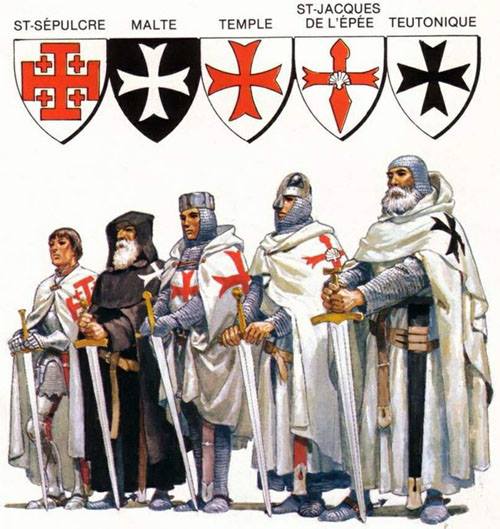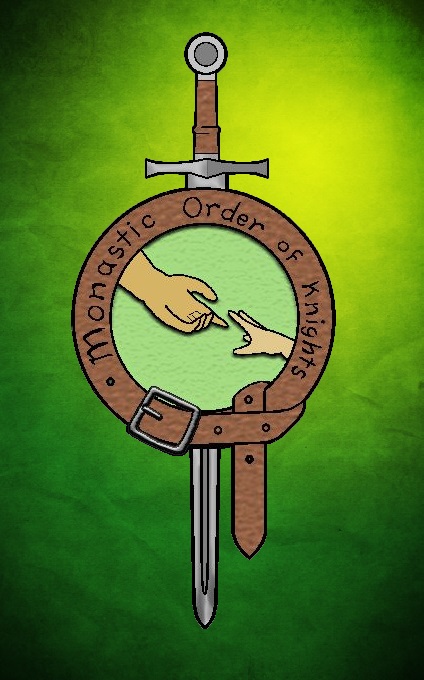Historical Catholic Military Orders: Were They Virtuous?
- Posts: 80
- Thank you received: 154
Most would recognize that these orders fought in the many crusades during Medieval times in the Holy Land, and not many would know but also in the Balkans, against Muslims and pagans. It is obvious that these were bloody campaigns with significant ammounts of lives lost on both sides in order to institute papal control and influence over foreign lands. This kind of military expansionism in the name of God would certainly be looked down on today as overly aggressive, oppressive and antithetical to Christian beliefs.
However, the Knights of the orders I mentioned above (and those I did not) dedicated their lives to this calling. They took vows of chastity, poverty and obedience and humbled themselves before God so that they could fulfil their primary purpose of protecting and caring for pilgrims in the Holy Land who were often murdered and robbed by bandits in Muslim lands. Eventually this task evolved into spearheading military operations with the purpose of spreading Christianity, or at least securing a foothold for it, by the sword.
With all this in mind, do you think that these Knights were virtuous in accordance with our own Order's understanding of this concept (being honest, compassionate, valourous, serving justice, sacrificing, possessing honour, and living in spiritual manner)?
I look forward to hearing your responses and sharing mine.
Please Log in or Create an account to join the conversation.
With all this in mind, do you think that these Knights were virtuous in accordance with our own Order's understanding of this concept (being honest, compassionate, valourous, serving justice, sacrificing, possessing honour, and living in spiritual manner)?
No, I do not for the most part. While many lived fully in accordance with the understanding of what was virtuous for their time and place in history, they were not virtuous by the standards we have here. This ties into a concept of historical study that suggests definitions and meaning change over time. Virtues in the world of the medieval knight were tied directly into medieval Catholicism. The way these were defined and established then are not the same as we define or practice them here in the Order. Our virtues are all practiced in light of the Natural Law. This makes membership open and available to anyone from any background that professes a belief in a higher power. In most cases, anyone that was outside Catholicism in the middle ages was regarded as anathema and subhuman. Therefore, the same courtesies we extend to everyone, they only extended to those that were "one of them" and even then, that was hit or miss. I think these Catholic Military Orders that still exist today are much more closer to being in accord with how we understand the virtues. Their campaigns are much more open to helping the outside world, however, they are still completely contained within the bounds of Catholic Canon Law.
All of this is not to say that there were no virtuous knights who lived these virtues in much the same way we do. I think a case could be made for the Templars after returning from Jerusalem (which oftentimes butted heads with the prevailing authority). It's hard to get through all the muck of the medieval past that isn't clouded by some sort of bias to develop a fully accurate view. But we don't have to worry about all of that either. When we were discussing the focus of the Order, we settled into a rather idealized and romanticized view of the medieval knight, not a historically accurate one. We wanted to express chivalric virtue as we understand it today, in light of the Natural Law, and not as it was understood or practiced then. Are there areas of overlap? Sure, but our character is distinctly modern and a touch masonic in that regard...things that define us for our particular place and time and separate us from the Catholic Military Orders of the medieval era.
Please Log in or Create an account to join the conversation.
Gemert
Gemert, located deep inside the Brabant landscape, is one of the best preserved villages in South-east Brabant and has a long and interesting history, which can be traced back to around 800 AD. Throughout the ages, Gemert has managed to preserve the atmosphere of this exceptional past. This was remarkable, because Gemert was an independent state under the supreme authority of the German Teutonic knights. This status as independent “Seigniory” was officially confirmed by Duke John I of Brabant in 1271 and lasted until 1794.
The German order of knights started building the current castle in the year 1391.
Rutger van Gemert became a member of the German Order in 1220 ,
in 1249 the German Order build a Latin School that tought Languages , artistic subjects , math etc but mainly religion.
Because the Town of Gemert was ruled by Rutger and his brother , the influence on the town of the Teutonic Order was enourmous , from wittten rapports we know that the Order brought peace , freedom and education to people in our village , that we were more free than the rest of what we call the Netherlands now. That they were an example or order and rest and that when they came back after a failed war in Jerusalem they guided Gemert through a few nasty wars , providing shelter to people of all kinds of religions , at first they did not allow protestants in the village but the villagers did not understand that , so the Knights let the protestants build a church , slightly outside the villag and its still there now much to the hilarity of the protestants themselves , seeing the whole of the Nehterlands is protestant now
So you see, as a Jedi , living in this village , i feel very privilidged , is calm , peacefull and open minded and it would not have been this way without those Knights , and you can feel them still when you are here , i was in the castle last Saturday and when i saw how much of it is still around and the sacrifices made , i am very humbled ...
Please Log in or Create an account to join the conversation.
- Posts: 166
- Thank you received: 299
The Templars, for instance, began as 20 or so rich guys who pledged their lives and wealth to protecting Christian pilgrims headed to the Holy Land, but there is a lot of evidence that they had other secret motives.
Some believe they were commissioned by the Catholic Church to pillage religious relics from the Holy Land which is why they were stationed directly above Solomon's Temple in Jerusalem. Others believe it was all part of a way to establish international banking controlled by the church in order gain wealth and property by offering loans and then leveraging them to gain land.
Ultimately, the Templars became more powerful than the Pope was comfortable with and a lot of royalty around the world owed them money so they were persecuted, tortured, and eventually killed or forced into hiding.
Was it the Orders that were virtuous or not? Was it the church? Was it just the individuals at the top of these secretive orders controlling a bunch of other aspects of society? We may never know all of the truth.
First Knight (Nov 26th, 2018)
Battlefield Commission - Knight
Apprentice to Wescli Wardest
Please Log in or Create an account to join the conversation.
- Wescli Wardest
-
- Online
- Meister
-

- Posts: 882
- Thank you received: 1112
I have roles this around for several days now considering the question at hand.
Like with any group one has to consider the individual. Any number of assumptions and descriptors can be assigned to the group depending on which actions of its members one chooses to focus on.
You also have to ask at what point in the crusades. There were several of them conducted for different tea d one over several hundred years. The commanders differed, the troops differed, the conditions differed and their enimy constantly grew in strength, numbers, area held and attact and politics was ever on the move.
For the Christian armies the crusades ended long ago but the Jihadists still declare and sage eat against us and the rest of the infidels.
Right now we have the luxury of relative peace to idealize our principles. But when we are in war, what may seem in accordance at the time, given the situation, may be viewed differently by those looking back and second guessing us, our actions and our motives.
I don't know that I can judge those that came before us by our understandings and ideals. Especialy since I was not there to experience what they went through and only have history books to go on. And I do suspect that if I would have been there people today would look back and question my actions as well.
What I suspect... Given my experience with the decendants of the people's the crusades went off to fight, I would probably not have been as lenient as some of my crusading ancestors.
Please Log in or Create an account to join the conversation.
As I see them as expeditionary forces, and in those days with no capacity for oversight it was likely left to that religious obedience to tether the crusader back to their roots.
So I think the biggest difference to here might be that we have to be self sufficient and not rely on an external entity to submit in obedience - instead using being guided to a moral framework which we enact within our local legal landscapes to find a balance as the most effective view and action.
極代 ~ per ardua ad astra
Please Log in or Create an account to join the conversation.
Please Log in or Create an account to join the conversation.
- Posts: 80
- Thank you received: 154
jzen wrote: Jager, what are your thoughts on this?
I am sorry that I've been out of the loop for a couple of weeks and have not replied. I have been quite busy with work and transitioning to the next phase of my and my family's life.
But, my thoughts are very much in line with everyone else's. I'm sure everyone will understand the reference here: They were virtuous, "from a certain point of view." That view being a place in time and the constructs that bore them and gave them power and authority.
As Christianity dominated the culture of medieval Europe and gave rise to these monastic orders, their exploits were seen as "virtuous." They had buy-in and carte blanche from the greatest moral authority that existed at this time- The Catholic Church. For instance, I've been reading about the Teutonic Knights (as mentioned by Serenity). They crusaded in Eastern Europe putting pagans to the blade in order to convert them to the Christian God. At the time, nothing could be more nobler than persuading people at all costs to abandon heathenry and accept the Europen-favored brand of Abrahamic monotheism. However, this kind of activity would have you condemned by modern society, hunted down, given swift trial and probably put to death depending on where you attempted this kind of activity. From a detached view, it's obvious that they did not seek to serve Natural Law but God's will (or, at least what they percieved to be God's will)
I find these orders fascinating because of their contemporary virtuousness (amongst other reasons) but, they certainly do not qualify when pitted against the virtues that we hold dear here within our Order.
Please Log in or Create an account to join the conversation.





